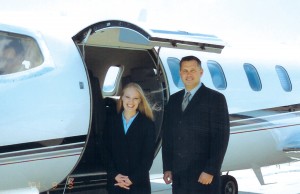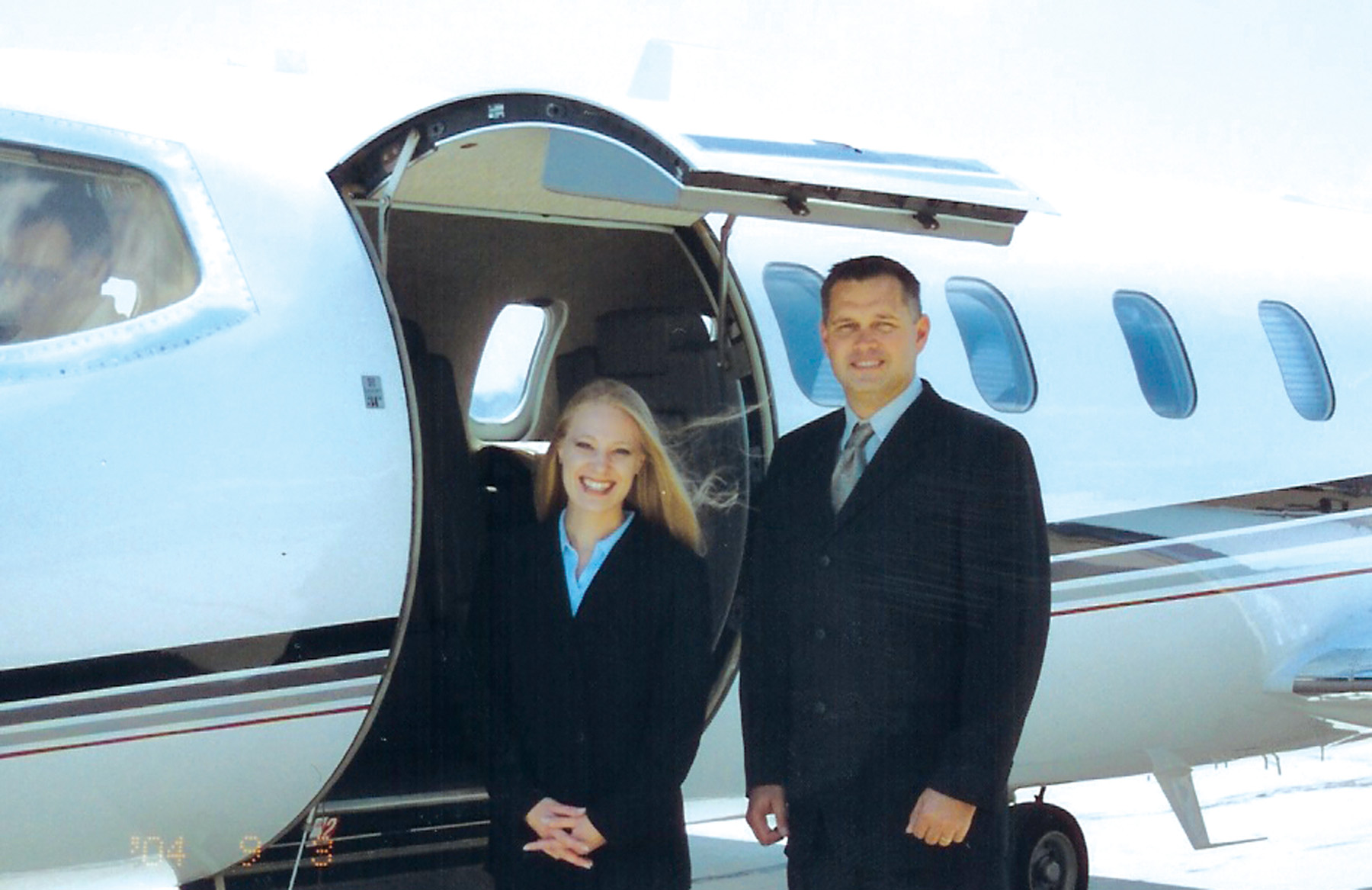By S. Clayton Moore

Amy Lichtenberg, a former Gulfstream manager, and Shawn Scott, a veteran flight instructor, branched off their own training division to focus on international procedures.
Two aviation professionals are taking international aviation training to a new level. Formed just last year, Scott International Procedures is filling the need for qualified, real-world international procedures training. Its two principals, Amy Lichtenberg and Shawn Scott, are traveling around America to make sure that flight departments everywhere get the annual checkup on international flight that they really need.
“There was a void in the training niche,” Scott explained. “It’s a specialized field; there aren’t a lot of companies that provide this type of training or who are qualified to teach international procedures. It’s an area in which we can focus on what the client really needs.”
It’s a strong partnership where each side brings in different strengths and abilities. Scott, a retired maintenance test pilot with 20 years of service with both the U.S. Coast Guard and Army, brings first-rate training and a vast experience in business aviation and international procedures. Following his retirement from the military, Scott services a major commercial airline as a pilot ground school instructor in Boeing and Airbus aircraft programs as well as teaching international procedures integrating cockpit systems.
Lichtenberg has a decade of experience in service and support in business aviation. As manager of customer service for Gulfstream Aerospace and an account executive with SimuFlite Training International, she’s gained a unique understanding of both the corporate training environment and the inherent needs of corporate aviation.
Based in Fort Worth, Texas, they travel extensively to teach the company’s Standard Recurrent International Procedures Course, an eight-hour course incorporating different training modules on automated cockpit considerations and limitations, contingencies and necessary communications and navigation equipment, as well as a sample westbound flight crossing the North Atlantic. Elective training modules focus on specific needs and geographic areas including India, Russia, South America and Africa.
The course, based on the training philosophies ingrained in all aspects of the company’s offers, focuses strongly on the resources that pilots need when traveling overseas.
“The one thing that is really in demand in today’s environment is knowing where the resources and information that you need in the cockpit are,” Scott said. “We’re talking even before the flight begins. We focus heavily on resources in the classroom so that when pilots leave our classes, they know exactly where to get the information they need when they need it. We think that idea is key and our students have been very receptive to it.”
Scott finds that giving students a strong foundation that explains how aviation authorities around the world create rules gives students a much clearer vision as to why the rules exist.
“When we show them how the air spaces are designed and where the technology is going, our students can now begin to understand the structural foundation when it comes to these rules around the world,” Scott said.
Far from focusing on undefined situations, Scott also uses his classes to illustrate very real problems that pilots can encounter.
“Let’s say you’re flying a high-performance aircraft operating above the track structure,” Scott cited as an example. “If you have an engine failure, there’s a precise way to descend through that structure. You can’t just drop because you have all those aircraft beneath you. What you can do with your automation—before you even leave for the day—is to set yourself up in the event you have a contingency and need to come down through that structure.”
The course also offers some unique training materials that are only available through Scott International Procedures’ classes. Not the least of these materials is the company’s International Cockpit Reference Handbook, which was developed, written and published by Scott. The 200-page manual has proven to be an invaluable resource for Scott International’s clients.
“They love the reference handbook,” Lichtenberg affirmed. “People are always trying to finagle more of the handbooks out of us but we currently don’t offer them outside of our client base. People come to class sight unseen based on that book. They come back for the quality of the classes but the book really draws them in.”
Flexibility is another key to the company’s success. While many training companies require minimum participants, Scott International Procedures will go anywhere to train any number of people, if need be.
“We go to our customers,” Lichtenberg explained. “We have to. The biggest headache for companies is scheduling training. By not having a minimum requirement for the number of people in a class, we can now serve all the flight departments right alongside those with 50 pilots. We do ask that they open the classroom to area operators so there is an opportunity to interact with pilots that they probably would not see otherwise in their group, and it helps them share the expenses.”
In fact, they recently had a client who really needed their team to take an initial course for a trip planned three weeks later. However, their team was so scattered that they could only find two days in California where everyone was available for training. Scott maneuvered his schedule, flew to California, and got the client’s pilots trained.
“That level of service goes a long way,” Scott said. “We solved this guy’s problem in a big hurry. One of the things we won’t back away from is customer support. As a business decision, it doesn’t seem to make sense, but as an overall support decision that represents what we do, it makes perfect sense.”
Scott and Lichtenberg have taken the time to film their entire basic program so it can be presented on DVD to flight team members who may not be available at the time of initial or recurrent training.
“With the DVD, we can now go into a classroom with just a couple of folks and anyone else in the company can get the exact same training through the DVD that we offer with the live classroom experience,” Lichtenberg said. “The company still gets to maintain standardization across their operations.”
The flip side of the training operation is after-sales support. Far from abandoning their students following their training session, Scott and Lichtenberg maintain a dynamic database of links, resources and up-to-date information on procedures on their website. As members of the international operators committee of NBAA and with contacts throughout various governmental agencies, they watch the rules closely so they know when changes are coming and can share that information with their clients.
“We keep our students up to speed with any changes that happen even after they’re out of the classroom,” Scott said. “We’re certainly not trying to turn our website into a comprehensive resource like NBAA, but for international procedures this is a place where our clients can go and get the information they need to solve their problems.”
The feedback from the classes has been tremendous. Nearly all the company’s business has been gained through word-of-mouth or by letting potential clients audit a class.
“We’re in a unique position because I meet all the customers upfront and then pass them off to Shawn in the classroom,” Lichtenberg said. “I get all the phone calls telling me how amazing the class was. A lot of our clients have said our classes are like nothing they have experienced before.”
The pair is not resting on their laurels. In addition to performing initial training for new clients, recurrent training for any of the company’s 150 current clients, and marketing their services, Lichtenberg and Scott are continuing to develop their online curriculum as well as new training DVDs and investigating other services they may be able to provide. They also hope to grow the company, adding personnel so they can respond to short-term requests in a more dynamic fashion.
The company’s ideals may be best represented by the quote they have chosen to open their international handbook. Quoting the Greek philosopher Aristotle, it reads, “Excellence is an art won by training and habituation. We do not act rightly because we have virtue or excellence but rather, we have those because we acted rightly. We are what we repeatedly do. Excellence, then, is not an act but a habit.”
On the other hand, the sharp minds behind Scott International Procedures have a sense of humor, too. Written below the first quote is this gem: “Cape does not enable user to fly. Batman costume, Wal-Mart, 1995.”
For more information, contact Amy Lichtenberg at 817-691-2524 or visit [http://www.scottipc.com].











